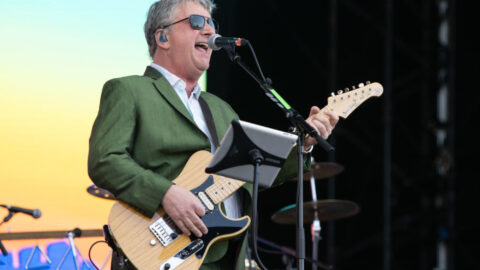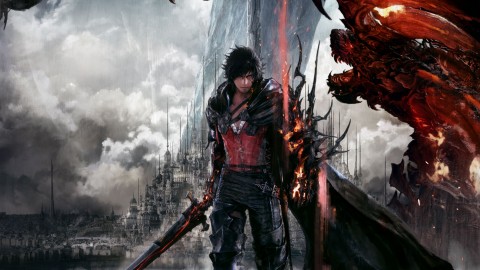
“This is gonna be another great year,” Shame’s Charlie Steen thought to himself at the end of January 2020, as he left the legendary La Frette Studios on the outskirts of Paris, the band’s second album ‘Drunk Tank Pink’ done and dusted.
Three weeks earlier, the south London five-piece had been in Chicago playing a New Year’s Eve show with the city’s indie rockers Twin Peaks, when they got the call that famed Arctic Monkeys producer James Ford, who defined a specific era of British guitar music in the early 2000s, had a last-minute cancellation at La Frette and wanted the band there in four days. Hurriedly, they rehearsed the new album by playing it in full at the boozy New Year’s Eve show, and then took their weary heads on the plane to France.

20 days of non-stop recording then followed, with the band laying down a curveball follow-up to their fantastic 2018 debut ‘Songs Of Praise’. A dark and angry punk record, that album provided intensity and intricacy in equal measure, with Steen its unrelenting, furious orchestrator (“My tongue will never get tired,” he bellowed on the raucous ‘Lampoon’). Critically acclaimed across the board, ‘Songs Of Praise’ was a first record that bottled up a very youthful, very British breed of anger, and saw them placed firmly on the top of the UK guitar music tree.
At the end of the La Frette sessions, Shame emerged with ‘Drunk Tank Pink’, an album with which they would stamp their authority on 2020 and obliterate any lingering ideas of ‘second album syndrome’. But you know how the story goes from there…

“If you told us when we were recording [the album], that it was going to be a year until it was out, I would’ve cried,” drummer Charlie Forbes tells NME. “It felt like we were on the final stretch. Everything we were planning to do this year just got pulled. This one massive thing that you were really looking forward to is not even happening this year, and it’s like…” He pauses, catching his breath. “It was frustrating for all of us, but I think it’s going to pay off now.”
This week, Shame will finally give the world ‘Drunk Tank Pink’, a funky, ambitious second record. Though fragments of the roaring post-punk set out on the debut remain, album two is defined by a new lightness, influenced by the bouncy guitars of Parquet Courts and Talking Heads. It’s a record about entering the depths of your own brain, learning how to be still and alone, and embarking on the difficult but necessary journey of self-understanding. It seems like it could help a few people right now.

The story of Shame’s beginnings is well-trodden by now. Forming at the Queen’s Head pub, the Brixton HQ of the Fat White Family, the band sat at the forefront of a burgeoning ‘South London’ scene featuring the likes of Goat Girl. With the band’s never-ending tour on the back of ‘Songs Of Praise’, though, that scene that birthed them dissipated before their eyes – almost as quickly as it had formed.
“Everyone got signed and then weren’t just playing at The Windmill for fun anymore. Now it’s a broader ‘post-punk’ thing that it’s shifted into,” Forbes muses over a socially distanced cuppa at Steen’s South London flat. It’s a few weeks before Christmas – on the kitchen table sits a predictably provocative homemade festive card from the Fat Whites, reading, ‘Woke Is Over! (If You Want It)’ – and the band are trying to digest a three-year period that’s been defined by upheaval. And that’s before you even get to 2020.
“If you told us when we were recording our album that it would be a year until it was out, I would’ve cried” – Charlie Forbes
“The scene shifted while we were away!” bassist Josh Finerty adds, almost incredulous. “We came back and were like, ‘What’s happened?! Who are you?! Where have you come from?’”
The band’s surprise and confusion is understandable. When you’re on tour – let alone on the road for two exhausting, non-stop years just as you’re exiting your teens – it must feel like the ground is constantly moving beneath you, the concept of home becoming more abstract by the day. And when you return to what you thought was home, it may well have changed while you were away. In many ways, then, Shame had to piece themselves back together after their non-stop thrash around the planet in support of ‘Songs Of Praise’.
Steen says of the band’s time on the road: “Looking back on those experiences – even though it could be seen as a brutal way to look at it – I am grateful that we got to experience all that at an early age, because now in the future, I know what I need and how to deal with it. Because this work is so hard, no matter what anyone else says.”

His usually affable demeanour becomes more rigid as he relives years that pushed his body and brain to the limit. “The reality is that it’s not going to be easy. If you really want to work hard at something, the feeling of exhaustion is a likely problem to occur at some stage. The main problem for us is because everything was new with ‘Songs Of Praise’, you just started to get fucked up all the time.”
It’s becoming an all-too-familiar story: a buzzy new band get some traction, go on tour with no end date in sight, rip their bodies and minds to shreds, and return home needing to piece themselves back together. Steen believes that “to some extent, this has probably always been a thing, but is just more vocalised now as people become more aware of mental health”.
In a recent digital cover story, Grian Chatten of Shame’s post-punk contemporaries Fontaines D.C. told NME about their punishing tour for lauded 2019 debut album ‘Dogrel’. “A few of us were fairly heavy on the gargle, on the booze for a while,” he said. “We drank almost exclusively whiskey for the whole tour. A pint or so of it before each gig, just to see you through and a bit more then after to help you sleep in the van. We weren’t really eating and we were burning the candle at both ends.”
“[In isolation], I had to get used to all the thoughts and emotions and realities I’d distracted myself from” – Charlie Steen
For Steen, the downsides of the never-ending tour centre on one particularly brutal European press trip that he and guitarist Eddie Green embarked on. “We did this three-week tour of America, got back to London at 11 at night, and then had to be at King’s Cross at 6am the next day,” he remembers. “We got a train to Belgium and did 10 interviews in a row, then went to Amsterdam and went out. Then the next day we had 15 interviews in a row, and then straight after that we went to Paris. The way that we were doing it was just drinking our way through it. From six in the morning when we got on the train, we just drank as a way to cope with it.”
Finerty gestures to his bandmate: “It was obvious to everyone how hard that was for you. I remember getting that message from our manager, and I was thinking, ‘That’s not possible. At what point does it stop?’”
Steen adds: “When you stop touring – and a lot of [‘Drunk Tank Pink’] is about that restless feeling, of wanting a cause for celebration all the time, and surrounding yourself with distractions – it’s learning that separation between the band and what you enjoy doing aside from that, because otherwise it’s going to become pretty hard to stay sane. It’s just difficult, because when you’ve got something good going, it’s natural to not want to stop it.”

When the band did return home, it brought with it a period of great reckoning. “We didn’t have a show for about three months, and we knew we weren’t practicing for at least two months,” Steen recalls. “We just spent the end of our teenagehood all together, surrounded by people all the time – and then suddenly you’re not, and you’re just watching TV. When we did Kentish Town Forum, it was the biggest show we’ve done, and my favourite show we’ve ever done. We went out and partied afterwards, and then the next day I was watching Saving Private Ryan on the sofa. It’s like dropping off a cliff.”
“I had a horrible time, that two months,” Forbes adds. “I was living on a boat, and just wasn’t going out or doing anything. Once we started writing, I kind of came back out.”
There were initial, substance-fuelled sessions in Scotland with producer Makeness. “There’s a whole file on there, ‘The Acid Jams’,” Finerty laughs. “It’s just very average jamming and a lot of laughing for an hour. We thought it’d be amazing and expand our minds, but I just sat there like… ‘Woah this cup of tea is really fucking me up right now.’” These particular files were abandoned, though, and the band spent the majority of 2019 crafting ‘Drunk Tank Pink’ in the bassist’s bedroom, with the lyrics birthed from Steen’s, er, womb.
“We played Kentish Town Forum, and the next day I was watching Saving Private Ryan on the sofa. It’s like dropping off a cliff” – Charlie Steen
Having moved into a sheltered housing project in New Cross in early 2019, where he set about refurbishing a room in an old nursing home filled with industrial washing machines, Steen finally had a place to call his own. Finerty, laughing, tells him: “I feel like you’re the only person I know who, after being offered that space, would actually say, ‘Yes, I’ll take you up on that!’ But you defied the nonbelievers!”
“Moving in there exaggerated the feeling of stillness when I got back from tour,” Steen says of his time he spent building a place to live, before he shows NME photos of the transformation from grotty laundry room to pink-walled haven. He sings about it on the ‘Drunk Tank Pink’ track ‘March Day’: “In my room, in my womb, is the only place I find peace.”
“That [renovation] project was fucking great for me,” he says. “It gave my mind something to do. The first night I stayed in that room, it was just strange, and it was strange waking up and being in there for day after day, when you’d been so used to being on the move and waking up in a different place every day, going from that nomadic lifestyle to just being still and alone.”

Craving the distraction that constant touring brings, and trying to dodge the increasingly dark and vivid dreams he was experiencing, Steen carried on the drinking that he had become accustomed to on the road. “There were people I knew who worked as bartenders in the pub, so it was quite easy to just go to the pub on your own,” he says. “Which isn’t necessarily the best thing. You really forget about normal structure.
“Like, the weekends. I remember getting on a train at 5 or 6pm, and being like, ‘Why the fuck are there so many people on this train?’ I’d totally forgotten about the concept of rush hour, and the fact that people aren’t available to go out every single night like you are on tour. I had to get used to all the thoughts and emotions and realities that I’d been able to distract myself from for two years.”
Across 2019, the band would craft the genesis of their new songs in Finerty’s bedroom, before Steen would take the instrumental recordings from those sessions back to the ‘womb’, and use the newfound stillness to craft his lyrics. “I wanted to take note of some of these dreams, and document it,” he says. “It’s a very ‘I, I, I’ album, which is very different to ‘Songs Of Praise’.
“When I met up with Grian [Chatten, of Fontaines D.C.] once, we were talking about how through all this touring, you become a lot more introverted. You value privacy so much in your own head. You’re touring with four other people who are having every experience with you. Every funny thing that happens, it happens to everyone. So finding your own moments to discover, that are yours, is so important.”

These discoveries burst out on ‘Drunk Tank Pink’, a second album that doesn’t so much see the band push forward as completely recalibrate their make-up. New single ‘Nigel Hitter’ feels like it’s lifted from a 1980s New York basement, while ‘Water In The Well’ sees Steen swap the rage of ‘Songs Of Praise’ for a playful, sardonic tone.
The new tones largely come courtesy of guitarist Sean Coyle-Smith, who spent his two months of freedom post-tour dissecting his guitar technique after becoming disillusioned with the way he was playing across years of cookie-cutter tours. Coyle-Smith – who’s absent from our cover shoot – pored over Talking Heads records and pulled apart his understanding of his instrument, before piecing it back together in fresh, new ways. This change is all over the new album, from the tricky, squirming guitar line of ‘Born In Luton’ to ‘Nigel Hitter’’s ’80s post-punk strut.
“Even though the album was written pre-pandemic, it deals with so much isolation” – Charlie Steen
“I don’t think it would’ve been possible to write the first album again,” Steen says of the new sonic swerve.
Forbes says he finds the mere idea of that “fucking boring”, and adds: “I don’t think we’ll ever write a tune and then think, ‘This is what the whole album is going to sound like’.”
Steen retorts: “There are definitely bands that do that: I’m sure The Jesus and Mary Chain heard feedback once and were like, ‘OK, sweet!’”
The lauded James Ford’s fingerprints are all over ‘Drunk Tank Pink’. The roaring chorus of ‘Water In The Well’ has traces of ‘What Went Down’-era Foals, an album the producer helmed, while ‘Harsh Degrees’ is carried along by a bubbling synth bassline.
“We just come up with a mish-mash of different sounding songs and hand them over and say, ‘Please make this make sense,’” Forbes says of the band’s offering to Ford. “There are some pretty different jumps around on this album.”

‘Drunk Tank Pink’ progresses from a series of playful early hits to a Side B filled with restless, claustrophobic post-punk; it feels like an accurate recreation of the crazed lives the group have lived since ‘Songs Of Praise’. The songs have clearly been pieced together with care and ingenuity; Ford has helped to make a record that sounds sharp as a knife in its fast moments, and booming in its anthemic ones (see the enormous breakdown on ‘Born In Luton’).
“I saw that he recorded that Klaxons album [2007’s ‘Myths Of The Near Future’] that I was into when I was 11 or 12 years old,” Finerty says. “I remember thinking, ‘I would like an album that sounds like this one day’.
“It’s a tough one, because if you’re handling the package, then the package is going to sound like your package,” he continues, his bandmates unable to conceal growing grins. “If you say that a producer just gave you what you want, I don’t even know what that would look like. I feel like James Ford gave us what we wanted, but he handled the package.”
“Basically,” Steen chuckles, “you have to be a really good producer… if you want to handle the package.”

In early January, sharing the release of their playful, loose new single ‘Nigel Hitter’ as the UK plunged into another national lockdown, Shame wrote in a Facebook post: “We find it weird sitting here wondering how to address this whole situation while campaigning for our second album. The winter of discontent is very much upon us and we know how difficult this new year will prove to be for us all. Unlike Boris, we’re not gonna pretend things are getting better.”
Despite the continuation of despair that still colours for the first weeks of 2021, does it give the band comfort that their album is coming out just a few weeks into what should end up being a much better year?
“I fucking hope so,” Steen says. “I was thinking about this yesterday. Even though the album was written pre-pandemic, it deals with so much isolation. I think it’s going to resonate with people even more, given the year everyone has just had. If this is a good year, then everything can change around.”
“We might do a Shame album and vaccine bundle,” Forbes laughs. “Jabbed up for pre-orders…”
‘Drunk Tank Pink’ ends with ‘Station Wagon’, a behemoth of a closing statement. “I need a new resolution and it’s not even the end of the year,” Steen sings over a slow, foreboding introduction, before the track then careens into a massive, cacophonous finale. Expelling every last demon in a fierce, fantastic monologue, he roars: “Nobody said this was going to be easy / And with you as my witness I’m going to try and achieve the unachievable.”

It was massive borne from personal turmoil, but the last year has made the statement universal. Shame have spent their 2020 sitting frustratingly on their hopes and dreams, as have the rest of us. It feels entirely suitable, then, that they greet the new year with such a forceful statement of new beginnings.
After that New Year’s Eve show in Chicago, excited about that James Ford call and with the promise of La Frette ahead of them – and expecting a 2020 full of hope – Shame indulged in a little fantasy. Steen recounts the fantastical imaginary tale they came up with: “Josh is out and about one day and is looking through a telescope, and he spots a planet that no-one has ever seen before, and it’s called Planet Cluj.
“Nobody in the world knows about it. And we then travel there, as Shame, to write our new album, and we only come back to Earth to broadcast it to the people. And then inside the lyrics, if you play it backwards, it will give you the exact location of where to go at what time, and you will be beamed up to Planet Cluj to live in peace for eternity with Shame.”
Indeed, as ‘Drunk Tank Pink’ fades out, Steen sings, “Join us on Planet Cluj.”
We all need a sense of escape and promise – whether that takes the form of an-joke from a heady night out or the dawn of a new year ahead – and Shame’s second album is an ode to grabbing a fresh start with both hands, in whichever way you see fit. Time for lift-off.
Shame’s ‘Drunk Tank Pink’ is out now
The post Shame: “If this is a good year, everything can change around” appeared first on NME | Music, Film, TV, Gaming & Pop Culture News.









